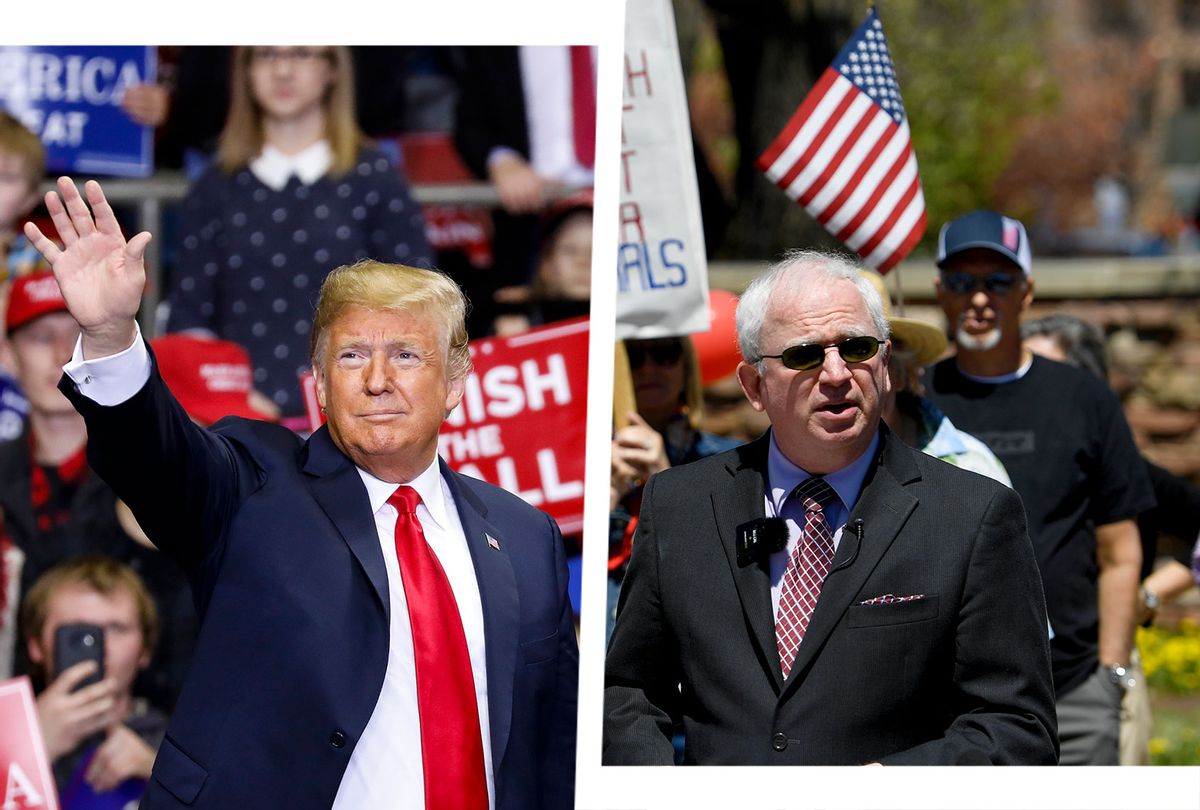A federal judge on Tuesday ordered conservative attorney John Eastman, who helped craft former President Donald Trump's strategy to overturn the election, to hand over more than 150 emails, including one that the judge said contains evidence of a likely crime.
U.S. District Court Judge David Carter ordered Eastman to turn over a batch of 159 documents sought by the Jan. 6 committee that were not protected by attorney-client privilege in a court ruling first reported by Politico.
Carter said one of the documents is a December 22, 2020 email exchange in which an unidentified attorney urged Trump's lawyers not to involve the courts in their bid to block the results of the election during the Jan. 6 session of Congress.
"Because the attorney concluded that a negative court ruling would 'tank the January 6 strategy,' he encouraged the legal team to avoid the courts," Carter wrote.
The judge noted that the email contains evidence of a crime and is not covered by attorney-client privilege.
"This email cemented the direction of the January 6 plan," he wrote. "The Trump legal team chose not to seek recourse in court — instead, they forged ahead with a political campaign to disrupt the electoral count. Lawyers are free not to bring cases; they are not free to evade judicial review to overturn a democratic election. Accordingly, this portion of the email is subject to the crime-fraud exception and must be disclosed."
RELATED: "The coup attempt is ongoing": Ex-Trump lawyer John Eastman still trying to overturn 2020 election
Carter also ordered Eastman to turn over 10 documents about meetings he had with an unidentified pro-Trump group whose "high-profile" leader met with Eastman to discuss Jan. 6 strategies.
The documents include a meeting agenda with a section called "GROUND GAME" that included an unidentified current member of Congress planning to "challenge the electors in the House of Representatives."
"The Select Committee has a substantial interest in these three meetings because the presentations furthered a critical objective of the January 6 plan: to have contested states certify alternate slates of electors for President Trump," Carter wrote. "Dr. Eastman's actions in these few weeks indicate that his and President Trump's pressure campaign to stop the electoral count did not end with Vice President Pence — it targeted every tier of federal and state elected officials. Convincing state legislatures to certify competing electors was essential to stop the count and ensure President Trump's reelection."
Some of the documents include communications directly from Trump that Carter determined were not covered by attorney-client privilege. One document was a photo with a handwritten note in which Trump wrote about the size of his rallies. Two others asked Eastman for advice about public statements related to their failed plot to send slates of fake electors to Congress.
Eastman was ordered to turn over the documents by Wednesday, one day before the committee begins to hold public hearings.
Want a daily wrap-up of all the news and commentary Salon has to offer? Subscribe to our morning newsletter, Crash Course.
Eastman in January sued to shield emails from his Chapman University account but Carter repeatedly rejected his arguments, insisting that the committee's work was necessary to protect democracy. Carter in March ordered Eastman to turn over another 101 emails, writing that the evidence shows that it is "more likely than not that President Trump corruptly attempted to obstruct the Joint Session of Congress on January 6, 2021," describing Eastman's strategy as a "coup in search of a legal theory."
Still, Carter on Tuesday ruled that more than 400 emails that Eastman sought to shield were protected by attorney-client privilege.
"Review of the 409 protected documents shows that none are 'pivotal' to the Select Committee's investigation," Carter wrote. "The majority of the documents include opinions and discussions about trial strategy in ongoing or anticipated lawsuits."
Eastman began advising Trump shortly after his election loss and cooked up a strategy in which states won by President Joe Biden would certify alternate slates of pro-Trump electors which then-Vice President Mike Pence could then unilaterally choose to count during the certification of Electoral College votes. But state legislatures rebuffed the attempts and Pence refused to participate. Trump and Eastman continued to pressure Pence until Trump on Jan. 6 directed a mob of supporters to march on the Capitol, where they hunted Pence and other lawmakers in a failed bid to stop the certification. Some Trump supporters erected a gallows outside the Capitol while others chanted "hang Mike Pence."
One day before the Capitol riot, Pence's top aide Marc Short called the head of the vice president's Secret Service detail to issue a warning about Trump's pressure campaign.
"The president was going to turn publicly against the vice president," Short told him, according to The New York Times, "and there could be a security risk to Mr. Pence because of it."
Read more:

Shares